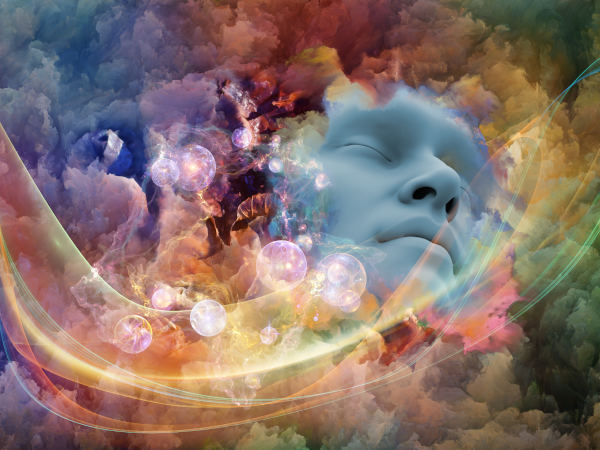Dream interpretation is the process of figuring out the meaning of one’s dreams. Though dream interpretation is not a scientific method, it is a common way of seeking to comprehend the importance of our unconscious thoughts and what our dreams reveal about us.
Determining what your dreams mean means looking for specific details and trying to figure out what they mean to you.
Dream analysis has been applied as a therapeutic method. It may be useful as a self-awareness resource when delving deeper into your subconscious and mental condition, as well as when attempting to achieve peace of mind.
Dream interpretation takes into account your associations and what each sign represents to you individually. In this case, analyzing your own dreams may be really beneficial.
Techniques for Dream Recall
The first step toward interpreting your dreams is recalling them. But a lot of people can’t remember their dreams when they wake up. Stress, processed foods, alcohol, and other factors can all shorten our REM sleep duration, which in turn shortens our dreaming time.
We usually have 4–7 dreams in a single night. Dream memory must be retrieved as soon as possible since within five minutes of the dream ending, half of the material is lost, and 10 minutes later, ninety percent has been forgotten.
The following suggestions can help you enhance your dream recollection:
Improving Dream Memory
There are several ways in which people claim that they can teach their brains to recall dreams.
- Maintain a Regular sleep schedule. Because you have the majority of your dreams during the REM period, you’ll want to make sure you’re getting sufficient REM sleep. To do this, you must sleep for at least seven hours every night and maintain a consistent sleep routine.
- Limit alcohol and caffeine. Such substances have the potential to impede REM sleep, which is when your brain is doing most of its dreaming. So, it is best to cut out these substances, especially right before bed. Instead, before going to bed, consume a warm, milky drink.
- Make a mental note to recall your dream before you go to sleep. During sleep, dreams normally happen in 90-minute intervals. Since interrupted dreams are frequently the ones we remember, it can be beneficial to wake up during one of these cycles if you are seeking to enhance your dream memory and recollection.
- On the other hand, any significant interruption will undoubtedly take your mind’s attention away because your dreams are already fading from memory when you wake up. To give your brain time to focus on recalling the dream, it’s better to wake up naturally. Try both to see what works for you.
- One other alternative is to deliberately prolong your period of semi-asleep or half-awake by choosing to stay in your morning grogginess.

Dream incubation
Every night, try to remind yourself to recall your dreams before you go to sleep. As you drift off, let that be your last thought. Try to remember your dreams as soon as you wake up, even if it’s only a feeling. This will eventually help you recall your dreams more clearly.
Keep a dream journal
As previously said, 50% of the content of a dream is lost within five minutes, and 90% is gone after 10 minutes. Thus, as soon as you wake up, it is important to start a dream journal.
People who write down their dreams as soon as they wake up tend to remember them more clearly later on. Even if you just recall little details or brief visions, it is critical to write them down. Patterns may emerge over time.
Keeping a dream notebook 1 or a dream app on your phone right after you wake up can help you remember the details of your dream. Researchers have used dream journals and dream diaries to help study participants more accurately recall their dreams 2. Some people keep dream journals to assist them in producing lucid dreams.
Why should you keep track of your dreams?
- Vital knowledge that is not easily accessible to you when you are awake is accessible to your dreaming mind. Your dreams are a window into your subconscious, revealing your hidden aspirations and sentiments.
- Remembering your dreams increases your knowledge, self-awareness, and self-healing. Dreams reflect how you view yourself. They could offer creativity, insight, happiness, imagination, and general psychological well-being.
- Developing the ability to remember your dreams might make you a more effective and confident individual. Through the recollection of one’s dreams, one can express and confront their emotions.
- Dreams may assist you with challenging decisions, marital troubles, health worries, professional questions, or any other life struggle.
- Recalling your dreams might help you cope with unpleasant areas of your life.
- Your dreams will teach you more about yourself, your goals, and your objectives.
Related reading: Are You Dreaming? Dive into the Science & Secrets of Dreams – Opens in new tab
How Reliable Is Dream Interpretation?
The quick answer is that dream interpretation is just as valid as the dreamer believes it to be. Dreams—and the symbolism included within them—might be an effective tool for better understanding what is going on in our waking lives.
Despite the lack of agreement among scientists about the intrinsic significance of dreams, dream analysis may be a useful technique for giving context to our experiences. It can assist in understanding difficult issues, addressing anxieties, controlling emotions, organizing memories, expressing desires, and promoting healing.
It may be beneficial for an individual to consult a professional, such as a dream analyst or psychologist if they become aware of a recurring theme or worry.

Dream Interpretation Tools
Dream interpretation has gained in popularity since the 1970s. You may get dream dictionaries, symbol guides, and suggestions for understanding and decoding dreams by purchasing books or using internet resources. (Check out some Dream dictionaries -Aff.link)
Dream dictionaries
If you wish to grasp dream meaning, you must first comprehend the symbolism in your dreams. A common way to figure out what your dreams mean is to use a set of symbols to guide you.
This is frequently seen as being at the heart of Freud’s dream theory. In reality, Freud demolished this simplistic conception of symbolic equivalences. All dream aspects are symbolic, yet they each have their own particular significance that can only be revealed via the dreamer’s associations.
You will not grasp your dream symbolism just by using dream dictionaries; you must also explain what that specific symbol means to you.
For instance, if I dream of a syringe, the interpretation of a dream dictionary is something like this:
“To dream of a syringe represents feelings of influence or emotional immunization against weakness or dependency.” A person or circumstance can affect your decisions, beliefs, or feelings. Favorable or responsible adjustments that produce favorable results. Changes that “immunize” you against difficulties, blame, or anxiety. A drive to cure, better oneself, or alter oneself.”
But I have “trypanophobia,” which is an extreme fear of medical procedures that involve needles…so, you understand that the previous interpretation does not apply to my case.
Related reading: The Language of Dreams: The Hidden Meanings of Common Dream Symbols – Opens in new tab
Online resources
There are many sites about dream interpretation that provide fixed symbolism interpretation. They may provide some guidance but always remember to take a more individualistic approach. The things we see in our dreams mean a lot more than what they seem to mean.
If you feel comfortable with this approach, try our “DreamInteprenter,” which is an online tool based on AI. It’s like having a personal dream guide right at your fingertips! And the best part? “DreamInterpreter” is absolutely free to use!

Professional dream analysis
If you experience reoccurring dreams or nightmares that are affecting your well-being, consider discussing them with a healthcare expert. These might be an early warning indication of depression, anxiety, or a sleep issue such as sleep apnea or nightmare disorder. Also, notify your doctor if you feel a medicine or medication discontinuation is causing your nightmares. If a diagnosis is made, a medical professional can also talk about possible treatments.
If you believe that your situation does not necessitate the assistance of a medical expert, you may like to meet with a sleep specialist. Sleep consultants can point you in the proper direction for a restful night’s sleep since they are qualified to address a variety of sleep-related issues.
Step-by-Step Guide to Dream Analysis
Dream interpretation requires perseverance, practice, and an open mind. Keep in mind that you give your dreams meaning by figuring out what they mean to you.
In this way, the same dream might imply various things to different people. Also, depending on when you dream it, the same dream may have different meanings for you.
Here are some steps to follow to analyze your dreams:
1) Write the Dream in Detail
Within minutes after waking up, it is easy to forget every detail of a dream. So, the optimum moment to recollect your dreams is right after you wake up, while the dream is still fresh in your mind.
- To capture your dreams as quickly as possible, keep a notepad beside your bed or use an app on your phone to take notes.
- If you frequently wake up throughout the night, keep a notebook next to your bed to record your dreams before falling back asleep. Making a voice memo on your phone may also be beneficial.
- Write down all the specifics of your dream, even if they seem insignificant: setting, people, objects, speech, scents, noises, color, and your “internal talk” and feelings while dreaming.
- It’s normal to remember just pieces of your dreams at first. They might not make sense or seem unclear. Your ability to remember details from your dreams will increase with practice.
Start keeping a dream journal.
Aside from writing or recording portions of your dreams as soon as you wake up, maintaining a more detailed journal may aid in dream interpretation.
When you wake up, attempt to write down as much detail as you can recall based on your notes. As you describe every part of the dream, write down how those symbols or scenes made you feel.
Make a careful note of any thoughts or recollections that come to you while writing about your dream. These thoughts, memories, or emotions provide extra information about what the dream may represent to you.

2) Identify Symbols and Associations
Making associations is the next phase. Consider the image from your dream, and then write down anything that comes to mind. Repeat this process for each dream detail you recorded in the journal you kept.
After you’ve written down the details of your dreams, go over your notes again to look for hidden symbols that you might have missed at first. These elements of your dream might also be related to its potential significance.
You should not consult a dream dictionary. Because your dream symbols are unique to you, there is no use in asking others or reading about them. The sole exception is if the dream incorporates archetypal themes that are universal to humanity. Characters such as a father or mother, kid, wise old man, hero, maiden, or trickster would fall within this category. The significance of archetypes is the same regardless of who you are or what your background is.
Asking the Right Questions
When looking for meaning in your dreams, you might want to ask yourself these questions:
- What role did the object or symbol have in your dream?
- How did it appear?
- In what place?
- In your dream, how did it make you feel?
- When you reflect back on that, how do you feel now?
- Upon thinking about this symbol in your dream, what immediately comes to mind?
3) Connecting Dreams to Real-Life Experiences
Dream interpretation enables you to determine whether your dreams mean something to you. There are a few things you can do to figure out what your dreams represent.
You should compare the activities and visuals in your dream to what happened throughout the day you had before. As such, when you are awake, you ought to be aware of what is in your dreams.
You will undoubtedly begin to see links between your dream images and your everyday challenges and successes if you begin maintaining a day notebook in addition to your dream journal.
For example, maybe your boss gave you a challenging assignment, and that night you had a nightmare about being lost in a maze. A stressful meeting at work left you feeling overwhelmed, and you had a dream about being caught in a thunderstorm. Or, your friend surprised you with a thoughtful gift, and that night you dreamt of being on a peaceful beach.
It’s possible that you have specific types of dreams when you sleep, such as vivid or recurrent dreams, or maybe you’re suffering nightmares. It might be beneficial, particularly if you wish to prevent nightmares, to try to understand the meaning behind these kinds of dreams.

4) Exploring Personal Symbolism
Rather than looking for a broad explanation, evaluate your individual associations with the material and themes that arise in your dreams. Some people might be scared of snakes in their dreams, while others might find them interesting.
With this in mind, while interpreting a dream, it is critical to rely on your personal life and experiences.
Your biases are another issue in dream interpretation. According to research, religious beliefs and interpersonal interactions might impact how you interpret your dreams. Consider whether you are seeking evidence that confirms 3 your present ideas while thinking about a dream.
Carey Morewedge and Michael Norton researched the dreams of over 1,000 people in the United States, India, and South Korea. 4
They noticed that few of the college students who took part in the study thought their dreams were just the brain’s reaction to random stimuli. Conversely, the majority supported Freud’s theory that dreams reflect hidden desires and impulses.
They also discovered, though, that biases play a big part in how much significance and weight people give to their dreams. Negative dreams are more likely to be remembered when they include people they dislike. Positive dreams about friends or family are also more likely to be taken seriously.
Put another way, individuals are driven to interpret their dreams in a way that confirms their preexisting ideas about the world, themselves, and the people in it.
Confirmation bias and self-serving bias, among others, can influence how dreamers react, according to the study’s authors.
Additionally, the researchers propose that dreams may potentially become self-fulfilling prophecies since individuals tend to take them seriously. If you dream about missing a deadline, you may be less motivated to work on it or even become so stressed that you perform poorly.
5) Interpret the Dream
Interpret the dream using all you’ve written so far. Always keep in mind that a dream is a meaningful, symbolically veiled communication from the subconscious. When you analyze the dream and come to an interpretation that “clicks” you’re on the right track.
There are a handful of caveats:
- You will not receive a message from your unconscious that you are already aware of. As a result, the dream’s message should come as a surprise to you.
- Your dream interpretation is probably wrong if it is based on self-congratulatory, self-inflating assumptions.
- It is equally inaccurate to reach an interpretation that places responsibility on other people. Dreams are only about you, not about others.
- Keep in mind that every character in your dream, regardless of whether they resemble someone you know, represents a part of yourself.

7) Meditate On Your Findings
After interpreting the dream, meditate on your findings. Meditating on your dream interpretation’s results is an efficient way to completely focus your energies and remove any distractions that may impact your perspective. It will assist you in developing a deeper connection with your innermost thoughts and emotions in order to make key decisions or answer important questions.
Personal Development and Dream Interpretation
Self-discovery through dreams
Dreams give the most universal and accessible insight into our deepest, unconscious selves in our journey for self-discovery. Almost everyone who engages in dream analysis finds it both fascinating and beneficial.
All people have the urge to feel connected to others, have a meaningful life, and respect and value themselves. Whenever they become unfulfilled in society as a whole, symbolic art, social movements, and other cultural forms arise as symptoms or efforts to restore what is missing. When personal needs aren’t met, imagery in dreams tries to bring things back into order.
Dreams usually appear to balance out or make up for conscious, one-sided lifestyles. We know that preventing people from dreaming causes them to become physically and emotionally ill. Therefore, it follows that even when we are unable or unwilling to recall our dreams, they nonetheless have a therapeutic impact.
Bringing unconscious pictures and symbols into our consciousness significantly boosts their therapeutic power, as Carl Jung’s work has consistently demonstrated.
Related reading: The Language of Dreams: The Hidden Meanings of Common Dream Symbols – Opens in new tab
Using dreams for problem-solving
When we’re stuck on a problem and can’t seem to solve it, or when we need to see something from a different angle, sleeping may provide creative ideas.
According to science, this isn’t only because we wake up with rested neurons. It’s also because our minds continue to function during the night. Even if we don’t recall it, we think and brainstorm in our sleep. As a result, it’s very probable that a solution to an issue you’ve been working on for a long time may appear in your dream.
Barrett, a psychology professor, conducted research in which students were asked to sleep on an issue for a week in order to come up with a solution. Even after the first attempt, half of the participants had a relevant dream, 5 and a third solved the problem.
Barrett said that one important thing is to care about the problem you’re trying to solve. Because a dreaming brain is emotionally oriented, it is simpler to dream about your love life or body pain than about mathematical challenges.
This is comparable to, say, giving up on a problem after giving it a lot of thought and failing to come up with an acceptable answer. Then, after a while, when you’re engaged in some other activity, the answer to your problem appears out of nowhere. It sounds like you experienced an epiphany.
This occurs because, even after you release the issue from your conscious awareness, your subconscious continues to work behind the scenes to find a solution.

Connection between dreams and mental well-being
Though there isn’t enough data to draw firm conclusions, there may be a correlation between your mental health and what you see in your dreams.
According to a 2018 study, someone’s waking mental well-being may impact the content of their dreams. 6 7 [8]
For example, researchers discovered that having peace of mind before going to sleep was associated with a higher likelihood of having happy dream experiences. Conversely, anxiety usually results in bad dream effects.
Based on these preliminary results, the study’s authors hypothesized that dreams might serve as indicators of mental health, providing you with information about your mental well-being.
And, because dreams frequently entail emotional reactions, it has been proposed that they may aid in the processing and management of emotions. They might help you prepare for whatever emotional obstacles you could encounter the next day and act as a means of emotionally refreshing.
According to some specialists, there’s a link between your emotional state and your sleep pattern.
Sleep deprivation may result in mental health problems, whereas reaching the REM cycle has been related [6] to mental health benefits.
End Words
Interpreting dreams is like taking a magical trip into another world; it reveals our innermost thoughts and feelings. Although not scientifically confirmed, it is a useful tool for self-awareness and personal progress. Dream recall, dream incubation, and maintaining a dream diary can all help you understand your own dreams more effectively.
The subjective significance of dream interpretation rests in its ability to provide a unique perspective on one’s experiences, concerns, goals, and possibilities for problem-solving. Whether we explore symbols on our own or seek expert guidance, the activity provides a glimpse into our inner selves.
Check out our recommendations at “Occult Bookshelf” and many free resources at our “Free Library“
Stay in Touch
 Join our newsletter by using the forms on this website or click here!
Join our newsletter by using the forms on this website or click here! Follow us on Google News
Follow us on Google News Follow us on Facebook
Follow us on Facebook
Featured image from Depositphotos
Sources
- Speaking of Psychology: The science of dreaming, with Deirdre Barrett, PhD ↩︎
- Spotlight on dream recall: the ages of dreams. By Anastasia Mangiaruga, Serena Scarpelli, Chiara Bartolacci, Luigi De Gennaro ↩︎
- Confirmation Bias: A Ubiquitous Phenomenon in Many Guises. Raymond S. Nickerson (1998). ↩︎
- When dreaming is believing: The (motivated) interpretation of dreams. Morewedge CK, Norton MI ↩︎
- The Committee of Sleep: A Study of Dream Incubation for Problem Solving and Dreams and creative problem-solving. By Deirdre Barrett ↩︎
- The Role of Sleep in Emotional Brain Function. By Andrea N. Goldstein and Matthew P. Walker ↩︎
- Peace of mind and anxiety in the waking state are related to the affective content of dreams. By Pilleriin Sikka, Henri Pesonen, and Antti Revonsuo ↩︎






